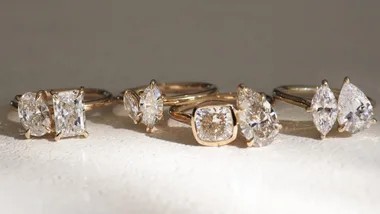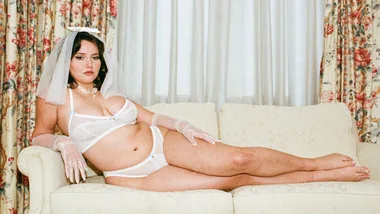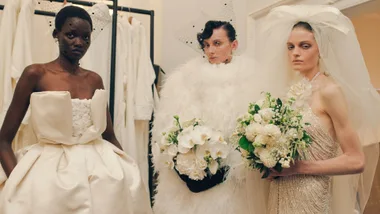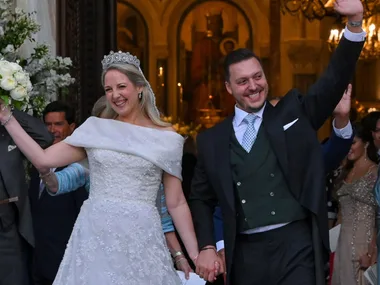For some newlyweds it’s one of the easiest decisions they’ll make, while for others it’s a minefield. These days, when we’re blessed with more choice than ever, settling on a final moniker can be surprisingly complicated. In Bride to Be’s 2014 Cost of Love survey, 85% of respondents planned to take their husband’s last name once they were married. And though the decision rests with the individual or couple, and depends on each person’s particular expectations and circumstances, family and societal pressure often clouds the process. Not only can a bride choose to take her new husband’s name or keep her own, there are also myriad other less traditional possibilities – from hyphenating, to combining your last names, or even creating an entirely new name from scratch.
It’s important to remember that it’s perfectly legal to call yourself by whatever name you wish. The only time you need to make a firm decision is when you’re updating passport details (a new passport under your married name is free) or setting up other official documentation.
While some brides hold onto their maiden names as a way to preserve family connections, others have career consequences to consider. With the average age of first-time brides on the rise, many women are having to make the choice between the name they’re known by professionally or starting from scratch with their husband’s surname.
Having built up a substantial resume under the name she was born with, TV producer Jo Townsend didn’t give any thought to changing her name. ‘Absolutely not!’ she says. ‘Never once considered it, and my now-husband never considered that I’d change it either. I’m a journalist, so my name means a lot to me professionally – as a TV producer it is all I have as a business card, really, that people might know my body of work through my name.’
So far, the only minor downside has become apparent since the birth of her son, Teddy. ‘When phoning my son’s swimming teacher or doctor’s surgery, saying
“Hi there it’s Jo Townsend here, Teddy Heritage’s mum…” can be a bit of a mouthful! But lumping my son with two very long hyphenated names wouldn’t be any easier!’ She says the positives far outweigh that small gripe.
‘I’m really attached to it. It’s my identity,’ she explains. ‘I really like my name, and with a short first name like “Jo”, I tend to have been called “Jo Townsend” lots in my life,
so I don’t want to lose that.’
Fellow journalist Karlie Rutherford chose to go in the opposite direction, although the magazine editor admits she wasn’t sure what she’d do, even after she and her husband Ben were well and truly wed. ‘I didn’t actually make up my mind about what I was going to do until after I got married,’ she admits. Letting go of her maiden name wasn’t easy. ‘I’m an extremely proud Jeffrey,’ she says. ‘My family is very proud of our lineage. Growing up, the Jeffrey family shield was displayed front and centre in the hallway of our house and my sister and I were well aware of the achievements of our family. Also, being a journalist, I’d started to forge a portfolio in the name of Jeffrey. So it wasn’t an easy decision at all.’
Despite the sense of attachment to her family history, Karlie found herself won over by the idea of sharing Ben’s name. ‘The decision to do it came on our honeymoon. I know that sounds really silly!’ she says. ‘We pulled up at the hotel and as we got out of the car the hotel staff welcomed us as “Mr and Mrs Rutherford.” It came as a surprise, I wasn’t expecting him to say it, but I just really liked how that sounded.’
Happily, Karlie also says she hasn’t noticed any negative affect on her recognition in the industry. ‘When I first changed it I was told by some work contacts who were trying to reach out to me that it got a little confusing,’ she admits. ‘But I’ve been using Rutherford for four years now, so hopefully that’s not the case anymore.’
When Colum Black-Byron and his wife Megan tied the knot, they decided to create a hyphenated version of both of their names, after first modifying Megan’s German maiden name to a more user-friendly, Anglophile version.
‘It was more on my wife’s insistence that we change it,’ Colum explains. ‘About four months before the wedding her dad passed away, so she was still quite emotional and wanted to keep a link to him. Her maiden name was Schwarz, which in German means Black. So we went with Black-Byron, since Schwarz-Byron just sounds weird
and didn’t flow.’
While most of the couple’s friends and family reacted positively to the shared name change, Colum’s father was initially a little hesitant. ‘The only one who seemed to care was my Dad,’ Colum says. ‘He asked me if we were still related, I said yes, and he was fine with that.’ As for whether he and Megan ever considered creating an entirely new surname, Colum feels that would have been too unsettling and difficult. ‘I think that’d only really be a thing if you had a bad relationship with your family,’ he says. It’d have probably been a little insulting to my family as well.’
Emily McBlack doesn’t agree – she and her husband Rob amalgamated their last names, Blackburn and McIntosh, to forge an entirely new family moniker for themselves. ‘We considered everything at one point or another,’ Emily says. ‘My husband – then fiancé – was quite taken aback the first time I brought up my hesitations around changing my name. He didn’t really understand the issue, and I think he just assumed that I would take it – which was fair enough, seeing as we hadn’t discussed any differently!’ The pair didn’t take the decision to change both of their names lightly and at first they weren’t even sure what the best way forward might be. ‘During our discussions, I explained my reasoning to my now-husband – if my little brother didn’t have a boy, then it was likely our family name would be gone forever if I changed my name. He was the last male in the family with our surname,’ Emily explains. ‘Conversely, his family already has three young boys carrying on the family name. I think when I explained that particular point to him, he realised that I was giving something up – and that maybe we should try and work out just why we wanted to change our names, if we wanted to at all, rather than blindly following the tradition.’
Once Rob and Emily were on the same page, they realised that since they both wanted a family, a whole new name would be the best choice for them. ‘We decided that we wanted the same name for our children, and after much to-ing and fro-ing between creating a new name and having a hyphenated name, we finally decided on a new name of our own, on the proviso that we spent time and effort tracking our family history, so that we could pass that down and not let it get lost with our change,’ Emily explains.
Nearly all of their friends and family have been supportive of the mutual name change. ‘Most people have been quite positive about it,’ she says. ‘My father, strangely enough, was the most shocked by it, which I always found quite funny seeing as traditionally I would have been ditching his name anyway. I think it’s just a really new idea
to him, and he’s never really been negative about it, just a bit confused. Other than that, the only criticism we have really received is from people who think we should have changed it to Blackintosh instead of McBlack!’
THINGS TO CONSIDER
Changing your surname after marriage? You’ll need to update your details on all of the following:
Ø Driver’s licence
Ø Electoral roll
Ø Passport
Ø Vehicle registration
Ø Property titles
Ø Employer records
Ø Bank accounts
Ø Credit card accounts
Ø Insurance policies
Ø Medical records
Ø Your Will
Ø Membership cards
Ø Superannuation
Ø Insurance/
health funds
85% of brides will take their husband’s name after they are married.
* according to bride to be’s cost of love survey










